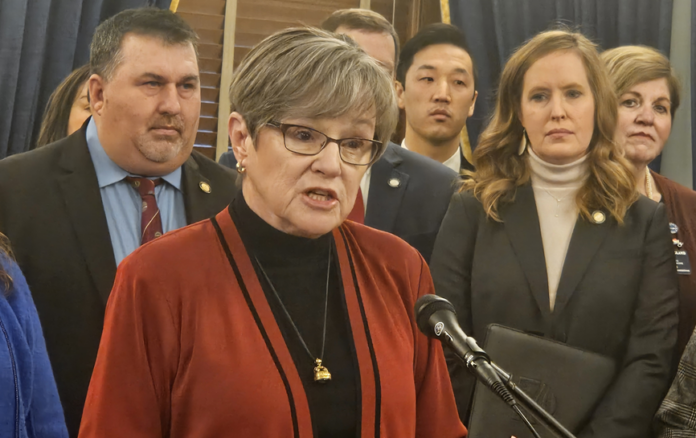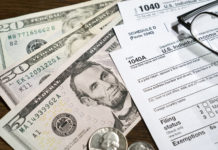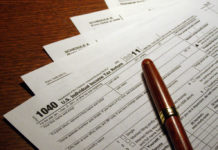Every now and then, Democratic Gov. Laura Kelly has shown a tendency to buck her own party in the Kansas Legislature.
Notably, she’s done it twice in recent years, once signing an election-year bill banning sanctuary cities over the opposition of most Democrats in the Legislature.
A year earlier, Kelly signed another bill opposed by Democrats in the Legislature that fined businesses for refusing to waive federal vaccine mandates for religious or medical reasons passed during a historic special session on Thanksgiving week.
Now, the governor is positioned to part ways with her own party again, this time on maybe one of the biggest pieces of tax legislation she’s considered since taking office in 2019.
There is already a growing view in some quarters that the governor – for the sixth time during her two terms as governor – will veto a tax bill.
She did three times in her first term, twice in 2019 and again in 2021, out of concern that those tax plans – mostly centered on corporate taxes – would break the budget.
The governor’s veto was sustained twice, but the Legislature overrode the governor’s veto in 2021 following the 2020 elections.
She has since vetoed two tax plans- one this year and one last year – that would have moved the state to a single income tax rate, and she may very well veto the latest compromise proposal that creates a two-tiered rate.
Kelly is already telegraphing that the cost of the new $1.56 billion tax plan over three years is too expensive, coming in at $35 million to $40 million more a year than the governor thinks is fiscally sustainable in the future.
Kelly has said she wants to see the new revenue estimates that are due out on Friday to help determine whether the tax package is too rich.
She noted the state’s revenue picture has been softening in recent months.
For example, tax receipts for the state general fund for the first nine months of the current fiscal year were 2% below estimates, according to a legislative research report.
Individual income tax receipts were below the estimate by $29.3 million, or 1%
percent, for the fiscal year to date, while sales and use taxes were below the estimate by $57.6 million, or 2.1%, the report said.
Supporters of tax cuts point to the fact that the state was projected to have an ending balance of $2.8 billion at the end of the current fiscal year in June, although the Kelly administration says that includes $1 billion in one-time Medicaid reimbursements.
They say the state is hording money away that should be returned to taxpayers, pointing out that the ending balance is expected to be near $3 billion plus another $1.7 billion that’s been set aside in the state’s rainy-day fund.
Kelly has wanted to keep tax cuts in the neighborhood of $425 million a year and has supported one plan with three tiers that was projected to come in at about $430 million a year, although it was later voted down in the House.
But on a larger scale, Kelly’s decision on the latest tax bill may very well rest with her longtime pledge to keep the state out of fiscal trouble that followed the tax cuts enacted under former Gov. Sam Brownback, some say.
She’s campaigned for fiscal discipline over the years, using the Brownback tax cuts as a foil when she was elected in 2018 and again in 2022 when she was reelected.
“She doesn’t want to leave the state in the situation that Brownback left it in,” said former Senate Minority Leader Anthony Hensley, who served with Kelly in the Senate for 14 years before she was elected governor.
“Her legacy was that she brought the general fund budget back from the brink from where it was when Sam Brownback was governor,” Hensley said.

A fiscal profile developed by the Kelly administration’s budget division shows that the major tax bill – coupled with four other smaller tax bills pending in the Legislature – would leave the state $392 million in the red by 2029.
The profile, which includes the $25 billion budget that was just passed and 2.5% in yearly revenue growth, would gradually spend down the state’s ending balance from about $1.7 billion in 2025 to nearly $400 million in the hole by 2029.
However, the same profile includes contributions to the state’s separate rainy-day fund, which would grow over that same period to about $1.9 billion in 2029.
Ultimately, Hensley believes that Kelly will veto the latest tax bill.
“I think she’s viewing this tax bill as a bill that just goes too far in terms of the fiscal impact on the state general fund,” Hensley said.
House Speaker Dan Hawkins said the Legislature cut $300 million in spending to make tax cuts sustainable in the years ahead.
“We worked across the aisle with legislative Democrats to craft broad and sustainable, bipartisan tax relief for all Kansans,” Hawkins said in a statement.
“We have zero intention of deviating from that path of fiscal responsibility,” Hawkins said.
“After all this hard work by legislators, both rural and urban, we look forward to her signing the tax plan and joining us in providing bipartisan, sustainable tax relief to all Kansans.”
A veto pits Kelly against members of her own caucus who supported the tax bill when it passed the House unanimously, although Senate Democrats were cooler to the bill with many of them voting against the legislation.
“I would certainly hope that the governor does not veto the tax bill,” said Democratic state Rep. John Carmichael of Wichita.
“I can see a revolt among some of my colleagues if the governor did,” Carmichael said.

“We are running for reelection,” he said. “The governor is not only not running for reelection, she will never be running for reelection.
“She could find herself becoming a lame duck immediately if she were to veto the tax bill and somehow the votes were found in the Senate to pass it,” he said.
“It’s a difficult decision for the governor,” he said.
Washburn University political scientist Bob Beatty said that while Kelly may care about good relations with House Democrats, her priority is protecting the state budget – an issue she’s been known for since she ran for governor in 2018.
“I think she values her caucus, but her commitment to, in her opinion, sound long-term term tax policy is probably more important,” Beatty said.
“Even when times are good and people are saying, ‘We’ve got the money,’ she clearly is thinking that in two years things could change dramatically,” he said.
“I think she’s very committed to this idea of being very wary of anything that could haunt the state years down the road,” he said.
A veto, however, could put some lawmakers such as Democratic state Rep. Jason Probst of Hutchinson in a difficult position since he represents a district where most voters are unaffiliated or Republican, although Kelly carried the district in 2022.
“I think it makes things awkward,” Probst said of a possible veto.

“It’s another layer of decision making,” he said. “Now, the decision isn’t about policy. We made a decision on policy when we voted for it.
“The decision now is about whether to support the governor’s veto,” he said. “We’ll have to do that a number of times on a number of issues.
“For someone in a district like mine, I’ll support her on a lot of vetoes that are going to be difficult for me to support her on, but I’ll do it.
“I don’t need the added burden of supporting her on a tax plan that everyone in the House thought was good,” he said.
Democratic state Rep. Mari-Lynn Poskin of Leawood said she didn’t know how the governor would come down on the tax bill, although she would anticipate a veto if budget projections in the out years show the state running into financial difficulty.
“I would say that I trust her and her staff to take a look at it,” Poskin said. “The last think we need to do is drive ourselves back into the ditch of negative revenue.”
Poskin said she wouldn’t be ruffled by a veto of the tax plan.
“In the light of day, when we have all the information at our fingertips, I would expect Democrats want the same thing for the state,” Poskin said.
“They want a structurally sound budget, fair and equitable taxes that are sustainable,” she said.
“I plan to stay in this job for several more years, and I do not want to be put in a position where our revenue does not equal the minimum requirements to run our state well.
“I don’t want to be put in a position of raising taxes a few years down the road,” she said.
Poskin said she would prefer incremental tax cuts that keep the state in sound financial health over the long term.
Democratic state Rep. Brandon Woodard of Lenexa believes the Senate and the governor’s office are more in sync on the tax plan than the House.
He didn’t believe a veto would cause more division between the governor and House Democrats.
“I believe that if the governor were to veto this, this would force the governor’s office and the Senate to actually negotiate with the House for what this is going to look like,” Woodard said.
“Being able to pass something that’s going to help every Kansan is really important,” he said.
“I don’t think it strains the relationship at all.
“I think it strengthens it by us all working together instead of the…Senate and the governor’s office solely working with the Senate.”
Americans for Prosperity says there should be enough money in the state’s coffers to make the tax cuts workable.
“With $3.5 Billion in excess and $1.6 Billion in our state rainy day fund, this tax compromise is affordable and necessary,” said Elizabeth Patton, Kansas state director for AFP.
“The only thing that should be considered unsustainable is Gov. Kelly’s spending wish list,” Patton said.
















